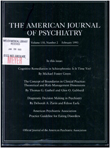Stressful life events and symptom onset in HIV infection
Abstract
OBJECTIVE: The authors' goal is to provide basic epidemiologic data on the issue of reactivity to stress and HIV symptom onset by studying the relationship between a broad set of naturally occurring stressor events and HIV natural history in a large longitudinal community sample of HIV- seropositive homosexual men. METHOD: Subjects were recruited from a cohort of 1,011 homosexual men enrolled in the Chicago site of the Multicenter AIDS Cohort Study who also participated in the Coping and Change Study. The men were given self-administered questionnaires assessing behavioral, psychological, and psychosocial variables. Relationships between reports of stressful life events and longitudinal biomedical data measuring illness progression were examined. Life events were assessed by reports on the numbers of lovers, friends, and acquaintances who were diagnosed with AIDS or had died of AIDS and by scores on a checklist of 24 more general serious stressor events. The variables indicating progression of illness among initially asymptomatic men were a drop in T-helper lymphocyte percent (CD4%) between pairs of examinations of at least 25% and onset between examinations of thrush and/or fever lasting a minimum of 2 weeks. RESULTS: The authors found no evidence that serious stressor events have any meaningful effect on symptom onset indicated by either a drop in CD4% or onset of fever or thrush. CONCLUSIONS: There is no need for asymptomatic people with HIV infection to restrict their lives in order to avoid exposure to stressful life experiences or to develop special skills for coping with stress to forestall the progression of HIV illness.
Access content
To read the fulltext, please use one of the options below to sign in or purchase access.- Personal login
- Institutional Login
- Sign in via OpenAthens
- Register for access
-
Please login/register if you wish to pair your device and check access availability.
Not a subscriber?
PsychiatryOnline subscription options offer access to the DSM-5 library, books, journals, CME, and patient resources. This all-in-one virtual library provides psychiatrists and mental health professionals with key resources for diagnosis, treatment, research, and professional development.
Need more help? PsychiatryOnline Customer Service may be reached by emailing [email protected] or by calling 800-368-5777 (in the U.S.) or 703-907-7322 (outside the U.S.).



